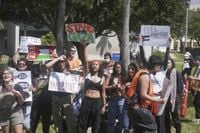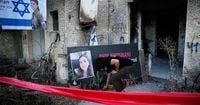Two years after the harrowing October 7, 2023 attacks by Hamas, a wave of protests, memorials, and heated campus debates has swept across the United States, reflecting the enduring and complex impact of the conflict between Israel and Palestine. From the streets of Boston to the lawns of Florida International University and the campus of Catholic University of America, Americans are grappling with the war’s legacy, the search for peace, and the struggle for free expression and safety on college campuses.
On October 4, 2025, Government Center in Boston was transformed into a sea of red, green, and white keffiyehs as hundreds gathered outside the Israeli Consulate to protest U.S. support for Israel. The demonstration, marking the second anniversary of the deadly attacks and subsequent Israeli military campaigns in Gaza, was more than a remembrance—it was a call for accountability and change. Protesters marched from the consulate near City Hall to the Boston Consulting Group’s (BCG) Seaport office, highlighting the company’s controversial role in the Gaza Humanitarian Fund (GHF).
Lea Kayali, an organizer from the Palestinian Youth Movement, didn’t mince words as she addressed the crowd. According to The Berkeley Beacon, Kayali accused BCG of complicity, stating, “BCG is a Boston-based corporation that actually participated in the creation of the so-called Gaza Humanitarian Foundation. [BCG] has engineered the aid distribution killing fields in Gaza that have led to thousands of people being murdered in just the last few months.” The United Nations had condemned the GHF plan, which encouraged the migration of Palestinians out of Gaza, and reported that over 1,000 Palestinians were killed by Israeli soldiers while trying to reach aid at GHF distribution sites.
The protest also targeted U.S. corporations with economic ties to Israel. Liza Behrendt of BDS Boston called out Capital One’s $500 million loan deal with Elbit Systems, an Israeli arms manufacturer. “Capital One is a top investor in Elbit [Systems], which is Israel’s largest weapons company,” Behrendt said. “That means Capital One is a lifeline to a company whose entire purpose is the murder of Palestinians.” Chants echoed through the financial district, with demonstrators stopping at Starbucks, Tatte, and the Capital One Cafe, all cited by organizers as complicit through their business dealings.
The protest unfolded against the backdrop of significant political developments. Last week, before Sunday’s march, President Donald Trump announced a new ceasefire deal, formulated alongside Israeli Prime Minister Benjamin Netanyahu. Hamas agreed to the deal with conditions, and both parties convened in Egypt for further peace talks. As of October 11, 2025—the day this article is published—the ceasefire has gone into effect, marking the first phase of a 20-point peace plan that includes Israeli troop withdrawal and the release of all remaining hostages by Hamas.
Yet, skepticism ran high among activists. Joe Tache, an organizer with the Boston Party for Socialism and Liberation, urged the crowd to remain wary. “These are not negotiations that have happened between equal parties,” he said. “It’s possible that, as they have so many times before, these negotiations fall through, because Benjamin Netanyahu and the Israelis have proven time and time again that they don’t want peace.” Paul Shannon of Massachusetts Peace Action echoed the urgency: “This has to end, and it has to end now. We don’t know how this new agreement, or what it really means, but as long as Palestinians are starving and being killed, we’ll be [protesting].”
Meanwhile, on October 9, 2025, about 40 students gathered on the Graham Center Lawns at Florida International University (FIU) to protest for Palestine, joining a nationwide wave of student-led demonstrations. Organized by FIU’s Young Democratic Socialists of America, the protest spotlighted international law violations, particularly the interception of aid flotillas to Gaza in apparent contravention of the United Nations Convention on the Law of the Sea (UNCLOS). “Even though as of this morning, a permanent cease fire is being reached by both parties, this is not enough, and our demand is, a free Palestine and self-determination to Palestinian peoples,” said Joselyn Pena, a YDSA member and environmental studies student, as reported by PantherNOW.
Protesters at FIU expressed doubts about the longevity of the ceasefire, citing a pattern of agreements made and broken over the past two years. Carlton Daley, an engineering and physics major who led the demonstration, reflected the mood: “We’ve seen this routine time and time again, where a ceasefire is proposed and we do not see the Israeli government or the American government genuinely and meaningfully in good faith, you know, respond and keep the ceasefire.” Despite the agreement, reports indicated that Israel attacked Gaza hours after the deal, fueling further distrust among activists.
The protest also highlighted the diversity of perspectives on campus. Some students displayed an Israeli flag and voiced disagreement with the demonstration, emphasizing the complexities and personal connections many feel to the conflict. Ethan Bazak, an International Relations student, remarked, “It’s very disrespectful to the people of Palestine that are going through a tough war and the people in Israel [as well]…to have kids that some of them have never been to the Middle East, their only source is either a university book or TikTok, and they’re here trying to lecture people on what’s going on in the Middle East when they’ve never been there.” The event underscored the importance of free speech rights on campus, protected by the First Amendment, as students on all sides sought to make their voices heard.
Elsewhere, the struggle for expression took a different turn. On October 7, 2025, Catholic University of America removed a memorial display for victims of the October 7, 2023 Hamas-led massacre, citing a policy that restricts the display of foreign flags on campus. The university’s Students Supporting Israel (SSI) chapter accused administrators of selective enforcement, noting that Palestinian and other foreign flags had been displayed previously without consequence. The university apologized for the timing, acknowledging the “deep disappointment” of SSI members, but maintained that the policy applies to all foreign flags except those of the United States, Vatican City, and Washington, DC.
The incident at Catholic University reflects a broader climate of tension and fear for Jewish students nationwide. According to The Algemeiner, the Anti-Defamation League (ADL) recorded 470 antisemitic incidents on U.S. college campuses in the two months following the 2023 attacks—a staggering 323% increase from the previous year. A recent survey by the ADL and the World Union of Jewish Students found that 78% of Jewish students worldwide have hidden their Jewish identity or support for Israel on campus to avoid antisemitism, with 81% concealing their support for Zionism at least once in the past year.
As the conflict’s anniversary passes, the United States stands at a crossroads—torn between calls for justice and peace, the realities of political alliances, and the urgent need to protect free expression and safety for all students. The past two years have left scars, but they have also sparked a renewed determination among activists, students, and communities to keep striving for a more just and peaceful future, no matter how daunting the path ahead may seem.


